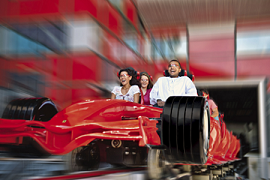UAE a hub for leisure and entertainment
By viji Tuesday, 09 June 2015 10:45 AM

Leisure and entertainment market potential is expected to reach 45m visitors by 2021
June 8, 2015
Dubai: The UAE’s leisure and entertainment market potential is expected to nearly double to 45 million visitors by 2021, according to a new report by international audit firm PwC.
Most of the visitors (30 million) are likely to be international tourists, while residents, their relatives and friends will account for 15 million. Also, by 2021, the country’s theme parks are forecast to attract 18 million visits, according to the “UAE’s transformation into a world-class leisure & entertainment destination” report.
The UAE is expected to see five additional theme parks by 2018, such as Six Flags, IMG Worlds of Adventure, Dubai Parks and Resorts (all three set to open in Dubai) and Warner Bros in Abu Dhabi.
Set to open next year, Dubai Parks and Resorts will have three theme parks: Motiongate Dubai, Bollywood Parks Dubai, and Legoland Dubai. It will also feature Riverpark, a grand entrance plaza, and Lapita, a family themed hotel.
PwC said that the UAE can become a global leisure and entertainment destination, competing with places like Orlando, Hong Kong and Singapore if it takes a “holistic approach” to exploit its geographical location, good quality attractions and investment in infrastructure.
PwC said that the new theme parks will need to deal with the diversity of visitors’ cultures and overcome climate-related challenges for the UAE to become a successful leisure and entertainment destination.
“The key to a consistently successful destination is enabling visitors to enjoy multiple attractions. Offering multi-park tickets, all inclusive packages and coordinated visitor management from booking through inbound and local transportation, hotels and attractions will be crucial,” Philip Shepherd, partner at PwC Middle East Hospitality & Leisure Leader, said in a statement.
Also, to holistically manage the UAE as a destination, there needs to be coordination between the stakeholders, including government departments responsible for infrastructure, tourism authorities, hospitality owners and operators and destination management companies, PwC said in the report.
The UAE already competes with Orlando, the market leader, in the scale of transport links, lodging, food and beverage facilities and its central location, according to the report.
Within the next six years, the UAE will have developed other enablers to compete with destinations like Orlando, PwC said.
“The other enablers are further investment in hotel rooms, airport capacity, airline routes, growth of the restaurant and retail sectors. We are also seeing the development of destination management entities who will drive the internal partnering and marketing and sales of the theme parks to visitors,” Shepherd said.
By 2021, 30 million people are expected to visit the country, PwC said.
The number of hotel rooms in the country will increase in the coming years too. Dubai, for instance, requires up to 160,000 rooms to attract 20 million visitors annually by 2020.
Concourse D at Dubai International Airport, which is now the world’s busiest for international passenger traffic, will lift annual capacity to 90 million once it opens this year.
Dubai’s second airport, Al Maktoum International at Dubai World Central, is expected to handle 20 million passengers in 2020.




























Add new comment